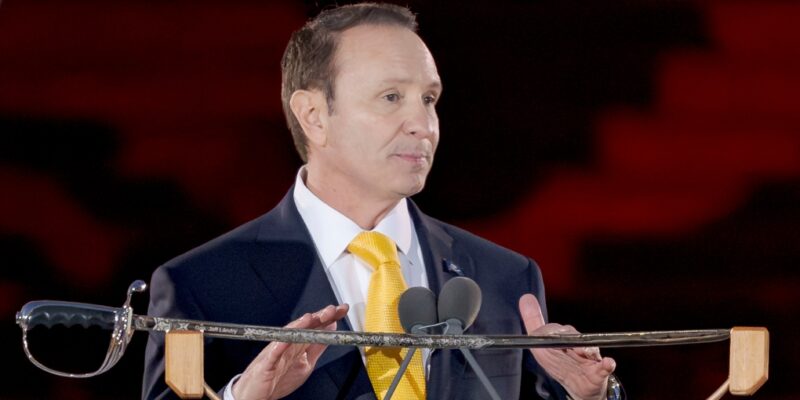Another “middle way” strategy by Republican Gov. Jeff Landry, before he was governor, may end up backfiring – or perhaps could pay off, depending upon the inclinations of his ally, GOP Pres. Donald Trump.
Just follow the money.
At present, Landry is battling to put an insurance reform package into law, one that he proclaims casts a pox on both houses—insurers and trial lawyers—for practices he claims needlessly drive up the cost of insurance. The move is something of a gamble, as compared to other states’ laws where insurance rates are much lower, Louisiana’s encourages litigation. Landry’s agenda doesn’t appear to move the needle enough to substantially reduce rates by discouraging litigation while not discouraging industry participation.
But this isn’t the first time Landry tried to find a path between opposing sides of an issue. As attorney general, he tried to discourage the state from intervening legally against energy companies that were alleged—along with coastal parishes—to have caused coastal damage through activities conducted illegally or without permission under state law. Use of state resources in this way was part of his predecessor Democrat Gov. John Bel Edwards’ sue-and-settle strategy: treat these firms as piñatas to be busted open for cash by allying with plaintiffs, use the state’s notoriously plaintiff-generous/jackpot justice courts to come up with a judgment against the target, and then work out a semi-extortionist agreement using the judgment as the hammer waiting to come down—with appellate prospects uncertain—that shovels settlement money to plaintiffs. In this case, that means government.
Instead, Landry backed parish governments in their quests, signing over to their lawyers, in effect, state cooperation to be exercised at their disposal. Under state law, this would channel any awards to specific parishes toward the state’s coastal restoration efforts. Had the state intervened, the money could have been used for other purposes—but that couldn’t happen, as the Legislature refused to enact enabling legislation conveying this power.
And cash is a major motivation in all of this. While the state does–and indeed must–kick in some monies from time to time for coastal restoration needs – projected at $50 billion worth – as well as benefit from federally apportioned offshore activity royalty generation, efforts have mainly been financed from the Macondo oil well blowout settlement, which will bring the state $8.7 billion through 2031. The clock is obviously ticking on that revenue stream, and a slew of judgments or settlements could exceed that figure.
That became apparent in a recent state court case that awarded Plaquemines Parish—though in reality, the money is for the state to use in and around the parish for restoration work—what could end up, with penalties and fees, exceeding $1 billion. With over 40 other such cases out there, the irony is rich: the state’s chief executive who decried the use of jackpot justice as attorney general now oversees a state seeking that very path to scratch up funding. (A settlement months ago involving Cameron Parish remains sealed, but likely involves a similar amount.)
There will be business consequences. A stern letter written by former U.S. Atty. Gen. William Barr warned Louisiana Republican Atty. Gen. Liz Murrill that the industry will fight these attempts. Barr argues against the legal merits of the case—about which Murrill disagrees—but most particularly calls for her to halt the state’s endorsement of the plaintiff parishes and specifically the carte blanche backing it has given to the trial lawyers representing them. A study conducted prior to resolution of any cases estimates that the state would have 53 to 74 fewer oil wells and would lose between $44 million and $113 million dollars in economic activity, as well as annually royalty revenues between $8.9 million and $22.6 million, because of the litigation risk associated with the coastal lawsuits.
Which is why, according to sources mentioned in The Hayride, Trump may get involved (introducing more irony: he and Barr didn’t part on very good terms). Trump recently issued an executive order that seems to counter the very course the state is taking, condemning states for using the legal system to discourage energy production—along with a vague threat to take action against such efforts. It’s also possible that a potential response could entail shoveling more federal money to states’ coastal restoration programs in exchange for cancelling these legal efforts. It should not go unnoticed that cooperation from Congress would be required—and Congress’s top two officials are from Louisiana.
Of course, the stick could apply as well as the carrot. Washington Democrats put Louisiana liquified natural gas projects into a deep freeze, which the Trump Administration only recently resuscitated. If Trump wanted to, federal regulatory decisions could tie projects up into knots in states he deems allow too much interference in energy concerns.
Yet if Trump and Republican congressional leaders choose carrots, Landry becomes the ultimate winner—having aided in setting up a regime to snare restoration bucks, then rescued from it without denting the state’s economic development hopes. This application of the “middle way” might prove more fruitful that the uncertain economic and political prospects he invites on himself over vehicle insurance.
Advertisement
Advertisement

